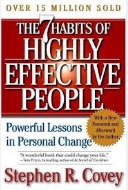Stephen Covey’s Seven Habits
In his book, The Seven Habits of Highly Effective People, Stephen Covey describes a practical set of habits that can help you grow personally to become more effective. His seven habits represent a principle centered, character based, inside out approach to personal and interpersonal effectiveness.
The Seven Habits:
-
Be Proactive
-
Begin with the end in mind
-
Put first things first
-
Think win/win
-
Seek first to understand; then to be understood
-
Synergize
-
Sharpen your saw
These Seven Habits help you develop personally and become more effective in how you work and relate with other people. Developing these habits can help you tackle your work and life challenges with confidence. At the core of these habits are a deeper understanding of yourself and an appreciation of the fact that you need others in order to achieve your goals.
Incorporating the Seven Habits into your Life
Good habits can be defined as the intersection of knowledge, skill, and desire. Changing or creating habits can be hard, but can be done if you are committed to change. You have to consciously work at them for a while before they become part of who you are and how you interact with other people. It takes time and effort to develop the Seven Habits. But it is worthwhile and will have a lasting effect on your personal effectiveness and on your life.
Stephen Covey’s Seven Habits – Stage of Personal Development
Covey’s approach is to have you focus on developing yourself as well as your relationships with others. He believes if the Seven Habits are integrated into your life, they will help you move through the stages of personal development.
His Seven Habits are not just a random list of habits that will make you more effective if you start implementing them into your life. The Seven Habits are designed to help you move sequentially through the following stages of personal development:
- Dependence (someone takes care of you)
- Independent (you can do it yourself)
- Interdependent (We can do it together)
Dependence
Dependence is where everyone starts in life. It is the stage where you are dependent on other people. You would be stuck at this stage without any personal development.
Independence
Through personal development, you become more independent and take responsibility upon yourself.
Interdependence
Interdependence is the stage were you embrace the idea of working and collaborating with others to achieve the best results possible.
Covey’s approach is to move you progressively on a maturity continuum from dependence to independence then ultimately to interdependence. Covey uses the Seven Habits to gradually move you through theses stages of maturity. Rather than being dependent upon other people, or trying to be totally independent, you learn how to be more effective by working with others to accomplish your goals.
Moving through the stages
As noted above, the habits are set up in a specific order to help you move through the stages of personal development. Since we are born into the dependence stage (having others do things for us), the Seven Habits begin by focusing on getting you first to independence and then moving you to interdependence.
The first three habits in the book take you from dependence to independence. These 3 habits deal with self-mastery required for character growth to move from dependence to independence stage. Habits 4 to 6 center on teamwork, cooperation, and communication. These 3 habits move you from independence to interdependence. The final habit focuses to your overall continuous growth and improvement.
How to Incorporate the Habits
Habit 1: Be Proactive
Being proactive means controlling your environment, rather than having it control you. You create this habit by taking initiative. Think about what needs to be done and do it. When faced with a problem or a difficult situation, take the initiative to find solutions rather than just recognizing the problem and waiting for others to solve it.
Habit 2 – Begin with the End in Mind
This habit is about visualizing where you want to end up. It is about looking ahead and seeing where you want to ultimately get to. So before you start something new, take the time to think about your ultimate goal, then plan how you will reach that goal. To practice this habit, begin each day, activity, or endeavor with a clear vision of your desired destination.
Habit 3: Put First Things First
This habit is about organizing and prioritizing your activities. The first step in developing this habit is to find out what is important to you. You have to determine what you truly value and put those first on your list of things to do. Often times people put the things they are believe are urgent at the top of their “to do” list. Unfortunately, they often find they do not have time to complete the things they believe are important because they have spent too much time on the urgent less important items. So, to develop this habit, find out what is important to you prioritize your activities so the important ones are on the top of the list.
Habit 4 – think win-win
The win-win philosophy sees life as a cooperative arena, not a competitive one. To incorporate this habit into your life, you need to create a frame of mind that has you seeking mutual benefit in your interactions with others. In your interactions with others, focus on getting agreements or solutions that are mutually beneficial to all parties. Don’t feel you have to get a better deal than other people. Have the mindset that there is enough for everyone.
Habit 5: Seek First to Understand; then to be Understood
Most people do not actively listen while they are conversing with another person, rather they wait to talk. When working with others do not be so anxious to get across your point of view that you do not listen to the other party. Really listen to the other party to try to understand his or her point of view. Try to get a good understanding of what the other person believes and how they feel about the topic. Then try to explain your perspective.
Habit 6: Synergize
This is the habit is about creative cooperation. Creative cooperation is based on the belief that people working together can produce far better results than they could individually. Synergy helps you discover things together you are much less likely to discover by yourself.
The key to achieving this habit is to value differences among people and try to build creative solutions through interactions. When you interact with others, be open to their opinions so you can gain new insight. These interactions help leverage individual differences to find a creative way to solve a problem. Focus on collaborating with others to get the best results.
Habit 7 – Renewal – Sharpen the saw
This habit is about personal renewal and growth. It is referred to as “Sharpening the Saw.” Sharpening the Saw means taking the time to enhance yourself and grow as an individual. It entails renewing yourself in all four aspects or dimensions of who you are:
-
mental
-
physical
-
social/emotional
-
spiritual
Developing this habit involves:
Physical – building your sense of well-being through exercise, nutrition, and stress management.
Mental – educating yourself on new things to hone and expand the mind through reading, visualizing, planning, and writing.
Social/Emotional – building your own sense of well-being through service, empathy, synergy, and security.
Spiritual – building a sense of self through meditation, inner reflection, spiritual reading, and study.



